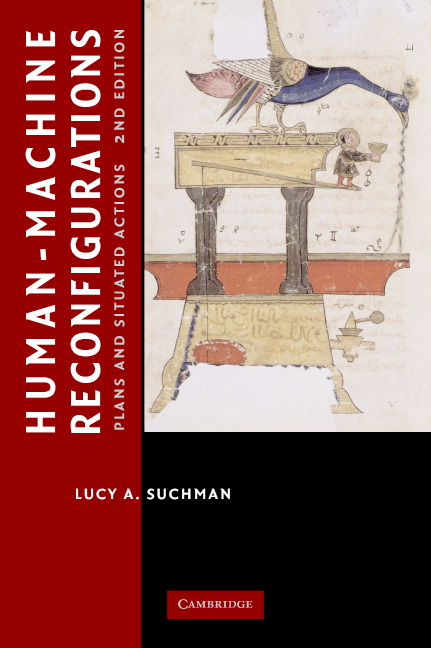Lucy Suchman: Human-Machine Reconfigurations: Plans and Situated Actions, 2nd ed (2007)
Filed under book | Tags: · anthropology, artificial intelligence, cognitive science, computing, ethnomethodology, human-computer interaction, interface, machine, robots, software, technology

“This 2007 book considers how agencies are currently figured at the human-machine interface, and how they might be imaginatively and materially reconfigured. Contrary to the apparent enlivening of objects promised by the sciences of the artificial, the author proposes that the rhetorics and practices of those sciences work to obscure the performative nature of both persons and things. The question then shifts from debates over the status of human-like machines, to that of how humans and machines are enacted as similar or different in practice, and with what theoretical, practical and political consequences. Drawing on scholarship across the social sciences, humanities and computing, the author argues for research aimed at tracing the differences within specific sociomaterial arrangements without resorting to essentialist divides. This requires expanding our unit of analysis, while recognizing the inevitable cuts or boundaries through which technological systems are constituted.”
Publisher Cambridge University Press, 2007
Learning in Doing: Social, Cognitive and Computational Perspectives series
ISBN 052167588X, 9780521675888
314 pages
Matthias Scheutz (ed.): Computationalism: New Directions (2002)
Filed under book | Tags: · artificial intelligence, cognitive science, computing, semantics, turing machine

“Classical computationalism—-the view that mental states are computational states—-has come under attack in recent years. Critics claim that in defining computation solely in abstract, syntactic terms, computationalism neglects the real-time, embodied, real-world constraints with which cognitive systems must cope. Instead of abandoning computationalism altogether, however, some researchers are reconsidering it, recognizing that real-world computers, like minds, must deal with issues of embodiment, interaction, physical implementation, and semantics.
This book lays the foundation for a successor notion of computationalism. It covers a broad intellectual range, discussing historic developments of the notions of computation and mechanism in the computationalist model, the role of Turing machines and computational practice in artificial intelligence research, different views of computation and their role in the computational theory of mind, the nature of intentionality, and the origin of language.”
Publisher MIT Press, 2002
ISBN 0262194783, 9780262194785
209 pages
Philip E. Agre: Computation and Human Experience (1997)
Filed under book | Tags: · artificial intelligence, computing, technology

“This book offers a critical reconstruction of the fundamental ideas and methods of artificial intelligence research. Through close attention to the metaphors of artificial intelligence and their consequences for the field’s patterns of success and failure, it argues for a reorientation of the field away from thought in the head and towards activity in the world. By considering computational ideas in a large, philosophical framework, the author eases critical dialogue between technology and the social sciences. AI can benefit from an understanding of the field in relation to human nature, and in return, it offers a powerful mode of investigation into the practicalities of physical realization.”
Publisher Cambridge University Press, 1997
ISBN 0521386039, 9780521386036
Learning in Doing: Social, Cognitive and Computational Perspectives series
392 pages

